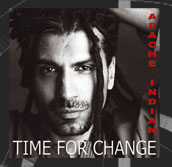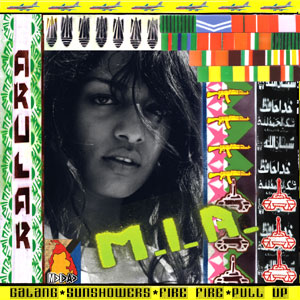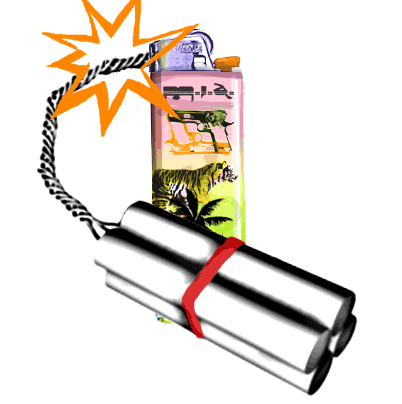April 15, 2006
What "Multicultural London English" sounds like
 A couple of days ago, I posted about "Multicultural London English", discussed in the press as "Jafaican" (or sometimes "Jafaikan"). None of the stories included any sound clips, and so I asked for suggestions about how to find something more authentic than Ali G, my only previous point of reference for this way of talking.
A couple of days ago, I posted about "Multicultural London English", discussed in the press as "Jafaican" (or sometimes "Jafaikan"). None of the stories included any sound clips, and so I asked for suggestions about how to find something more authentic than Ali G, my only previous point of reference for this way of talking.
Abnu from Wordlab recommended Apache Indian's recent remake of Desmond Dekker's great 1969 reggae hit Israelites. "Apache Indian" is the stage name of Steven Kapur, who was born in Birmingham of East Indian ethnic background, and has pioneered what his website calls the "fusion of Reggae, Raggamuffin, Hip Hop and Bhangra". As this audio sample indicates, Apache's performance dialect (at least in this example) is transparently "fake Jamaican", and therefore the term "Jafaican" is a reasonable description. But he started out in Birmingham, and so this seems to be part of a broader cultural fusion that is not limited to London. (Dekker's original might be the most prolific source of mondegreens ever, by the way.)
Jennifer Tillotson sent a recorded passage from a BBC Radio 4 interview with some London-area schoolgirls about female violence. She explained that she lives "at the other end of the country" and therefore "know little of how the youth down there speak nowadays".
However, I had to hit the record button when I heard these North London girls being interviewed by BBC Radio 4. I have no idea what their ethnic background is, but that's kind of the point, innit!
These young women (for example here) aren't speaking Jamaican, fake or otherwise, but they aren't speaking Cockney either. So I'm guessing that these are some variants of the "multicutural London English" that Sue Fox and her colleagues are talking about. (I'll freely admit ignorance of British dialectology; if you can characterize these accents more accurately, please let me know. The whole passage is available as a 3MB mp3 file here. I don't know when this segment was broadcast; if I find out, I'll substitute a link to the Radio 4 archives.)
Steve from Languagehat wrote to register a complaint about that phrase "multicultural London English":
Do you really think that's a better term? To me it sounds dry and misleading: what on earth does "multicultural" mean in a linguistic sense? "Jafaican" may be too narrow, but it's punchy and memorable and at least gives a nod in a meaningful direction.
Steve's got a point. But if the sociolinguists' claims are correct, the emerging dialect is a blend of West Indian English, East Indian English, and some other things as well, all grafted onto a Cockney and/or Estuary-English substrate. "Multicultural" is an plausible mnemonic for that kind of masala.
The trouble with "Jafaican" is that it seems to have started life as a sort of British version of "wigger": that is, a somewhat insulting way to refer to the culture of white or asian kids who decide to act (and talk) black.
Thus "Jafaican" isn't a reasonable term for the
young Cockneys from Tower Hamlets that (according to Sue Fox) are starting to copy
some vowel features and some lexical items from neighboring
Bangladeshis. On her account, at least as filtered through the news stories,
there are no Jamaicans, fake or otherwise, anywhere in that particular picture. And likewise, the speech of the girls in that BBC 4 interview is not "fake Jamaican", even if some Jamaican features are in the mix.
Still, I have to agree with Steve "Multicultural London English" is about as unlikely to become a popular piece of terminology as "African-American Vernacular English" was. And "Jafaican" feels like a lexicographical winner, even if it's misleading.
 [Update: David Donnell writes:
[Update: David Donnell writes:
Thanks for contextualizing this dialect for me.
For the past year or so I've been enjoying a CD called "Arular", by the artist M.I.A. (real name Maya Arulpragasam). Apparently the CD has won a number of awards and is fairly widely known by now.
M.I.A. is a young Londoner, originally from Sri Lanka, with family members who are/were Tamil Tigers, anti-gov't rebels back in the old country. (My wife is a South African with Sri Lankan roots, so we had some "cultural" interest in the artist.)
It is precisely the lingo that I find so engaging, and "Multicultural London English" or "Jafaican" would seem to describe the dialect pretty well.
Listen to, for example, "Pull Up the People".
[you can navigate to it via flash on her website -- myl]
Another interesting case -- linguistically. In other dimensions, though I don't know much about the who-done-what-to-whom in Sri Lanka, it's hard for me to get enthusiastic about a London-based artist who features a bundle of dynamite with a lit fuse on her web site. The content of "Pull Up the People" promotes the volatile metaphor of adolescent anger = religiously-inspired bombings = ecstatic music. With all respect to David, to multicultural London youth, and to the Tamils in Sri Lanka, this is topical and edgy, but isn't it also a little, you know, immoral?

slang tang
that's the that m.i.a. thang
i got the bombs to make you blow
i got the beats to make you bang
yeah me got god, and me got you
everyday thinkin bout how me get through
everything i own is on i.o.u.
but i'm here bringing y'all something new
you no like the people
they no like you
then they go set it off with a big boom
every gun in a battle is a son and daughter too
why you wanna talk about who done who?
what you wanna talk about?
slang tang
that's the that m.i.a. thang
i got the bombs to make you blow
i got the beats to make you bang
pull up the people, pull up the poor...
i'm a fighter, fighter god
i'm a soldier on that road
i'm a fighter, a nice nice fighter
i'm a soldier on that road
bring me the reaper
bring me a lawyer
i'll fight i'll take 'em on
you treat me like a killer
i ain't never hate ya
i'm a soldier on that road
i'm a fighter, fighter god
i'm a soldier on that road
i'm a fighter, a nice nice fighter
i'm a soldier on that road
]
Posted by Mark Liberman at April 15, 2006 06:49 AM